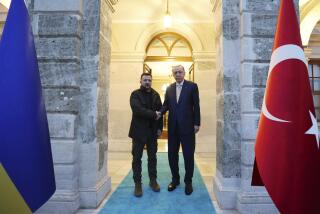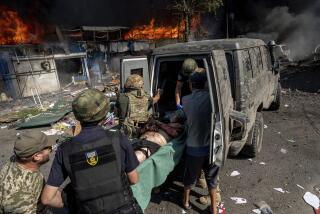Soviet Congress Appeals for End to Ethnic Bloodshed
- Share via
MOSCOW — The new Congress of People’s Deputies appealed Monday for an end to bloodshed in the Central Asian republic of Uzbekistan, where at least two people were killed and thousands of troops were sent to patrol streets after ethnic riots that were sparked by a brawl over the price of strawberries.
“Think about all the innocents who are threatened--women, children and old people. Stop the violence. Prevent injustice from being committed,” said the statement read at the Kremlin’s Palace of Congresses.
The appeal marked the first time the deputies have issued a joint call to ethnic minorities, whose demands have been given a broad airing since the tradition-defying assembly convened May 25.
The Kremlin took other steps in an effort to restore order. About 6,000 soldiers armed with machine guns were in place in Uzbekistan’s Fergana Valley region Monday night, and more were being brought in to enforce a curfew, said the country’s interior minister, Vadim V. Bakatin.
“We have enough power to repulse hooligans. If anyone thinks it is possible to make us submit to ultimatums, they should know ultimatums won’t work here,” Bakatin said on Soviet television.
Gorbachev’s Sticky Problem
Allowing nationalistic groups greater freedom of both expression and self-rule while preventing communal fighting in the Soviet Union’s 15 republics is proving to be one of Soviet President Mikhail S. Gorbachev’s stickiest problems.
Deputies representing many of the more than 100 ethnic groups from the Soviet Union have taken advantage of his policy of permitting greater openness to publicize grievances over the last week.
But some have warned the passionate debates broadcast live across the nation have simply fueled longstanding resentments.
A deputy from the republic involved in the latest violence said Monday that two Uzbeks were killed in clashes in Fergana Valley, which broke out Saturday between native Uzbeks and ethnic Turks.
Estonian Radio, in a report broadcast in that republic, also put the death toll at least two. It reported that a third person might have been killed and said about 100 people were injured, local listeners reported.
However, the toll may be considerably higher. The Reuters news agency said a regional broadcast by the main evening television news program “Vremya” reported “dozens of casualties (and) hundreds of wounded.” Reuters said the program, not seen in Moscow, was monitored by the British Broadcasting Corp.
Turk Overturned Stall
Deputy Rakhmatullah Akhmetov said the incident in the region at the southern edge of Uzbekistan began Saturday when a Turk overturned the stall of an Uzbek woman selling strawberries because he thought her prices were too high.
Some passing Uzbekis who saw the incident began a fistfight with the Turk and “after the brawl, an Uzbek died,” the deputy told journalists before Monday’s congress session opened.
“They should have clamped down then, but they didn’t, and it grew and grew,” he said, adding that “extremist” Turks and Uzbekis joined in the ethnic rioting.
The deputy said calm had not yet been restored to the valley. He said he telephoned his home Monday morning and was told “everything’s in smoke.”
On Sunday, authorities clamped a curfew on the area after “many citizens were beaten, policemen were attacked and cars and houses torched and public buildings wrecked,” according to a Tass report. The official news agency said there were casualties, but did not elaborate.
Gorbachev, acting Monday on a request from some of the deputies, won approval for the appeal to the people of Fergana Valley and read the statement aloud before the congress. It was broadcast live on radio and television throughout the country.
“We call on those taking part in the inter-ethnic conflicts to listen to the voice of reason and stop the bloodshed,” the statement said.
“Injustices and problems have been accumulating in ethnic relations and were ignored for years. But that does not mean painful questions cannot be solved.”
Akhmetov said about 700 Turks live in Fergana Valley with about 200,000 native Uzbekis. Josef Stalin deported the Turks from their homeland in southern Georgia during World War II because he feared they might support Turkey if it attacked the Soviet Union.
There is no history of conflict in the region between the two groups, which share the Muslim religion and a similar language. The Turks have, however, unsuccessfully petitioned Moscow to allow them to emigrate to Turkey or return to their Georgian homeland.
The last time fatalities were reported in an ethnic disturbance in Central Asia was in December, 1986. Two people were killed when protests broke out in the Kazakhstan capital of Alma Ata after Gorbachev replaced the local Communist Party leader, a Kazakh, with an ethnic Russian.
More to Read
Sign up for Essential California
The most important California stories and recommendations in your inbox every morning.
You may occasionally receive promotional content from the Los Angeles Times.













